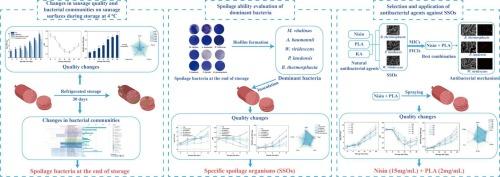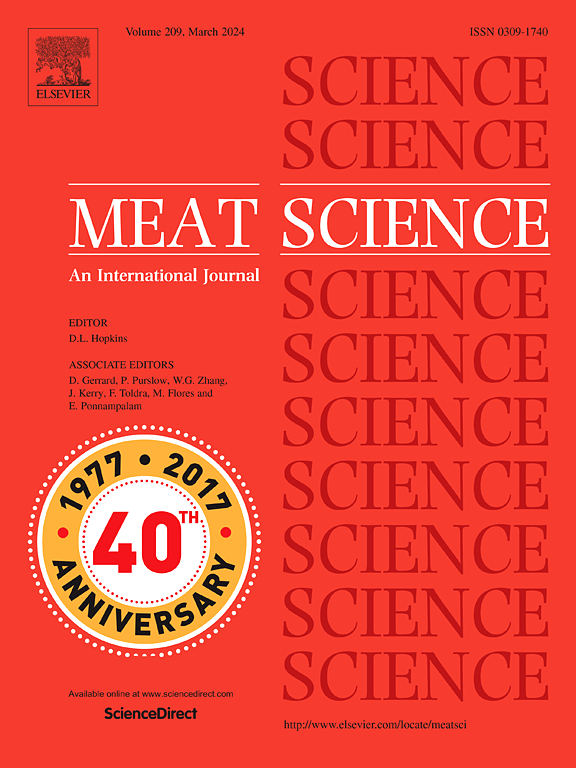Based on the specific spoilage organisms to improve the storage stability of bulk sausage
IF 6.1
1区 农林科学
Q1 Agricultural and Biological Sciences
引用次数: 0
Abstract
Bulk sausages packaged by natural animal or artificial collagen casings are highly susceptible to microbial contamination. In this study, quality changes of sausages packaged by animal casings were monitored and bacterial community dynamics on casing surfaces were analyzed by combining conventional bacterial culture methods and 16S rDNA sequencing during 30-day storage at 4 °C. Followed by evaluating the spoilage ability of the identified dominant bacterial community, three specific spoilage organisms (SSOs) were identified: Brochothrix thermosphacta, Pseudomonas lundensis, and Weissella viridescens. For the three SSOs, three natural antibacterial agents, nisin, phenyllactic acid (PLA), and kojic acid (KA), were selected alone or in combination to improve the storage stability of sausage. In situ experiments demonstrated that a combination of nisin (15 mg/mL) and PLA (2 mg/mL) most effectively suppressed the bacterial growth on sausages. These results are expected to provide a theoretical reference for extending the shelf life of bulk sausage.

针对特定的腐败微生物,提高散装香肠的贮藏稳定性
用天然动物或人造胶原蛋白包装的散装香肠极易受到微生物污染。本研究采用常规细菌培养法和16S rDNA测序法,对动物肠衣包装香肠在4℃条件下保存30 d后的品质变化进行监测,分析肠衣表面细菌群落动态。通过对鉴定出的优势菌群的腐败能力进行评价,鉴定出3种特定的腐败菌:热腐Brochothrix thermosphaacta、lundpseudomonas lundensis和Weissella viri下降菌。对于3种sso,分别选择nisin、苯乳酸(PLA)和曲酸(KA) 3种天然抗菌剂单独或联合使用,以提高香肠的贮藏稳定性。原位实验表明,nisin (15 mg/mL)和PLA (2 mg/mL)的组合最有效地抑制了香肠上的细菌生长。研究结果可为延长散装香肠的保质期提供理论参考。
本文章由计算机程序翻译,如有差异,请以英文原文为准。
求助全文
约1分钟内获得全文
求助全文
来源期刊

Meat Science
工程技术-食品科技
CiteScore
12.60
自引率
9.90%
发文量
282
审稿时长
60 days
期刊介绍:
The aim of Meat Science is to serve as a suitable platform for the dissemination of interdisciplinary and international knowledge on all factors influencing the properties of meat. While the journal primarily focuses on the flesh of mammals, contributions related to poultry will be considered if they enhance the overall understanding of the relationship between muscle nature and meat quality post mortem. Additionally, papers on large birds (e.g., emus, ostriches) as well as wild-captured mammals and crocodiles will be welcomed.
 求助内容:
求助内容: 应助结果提醒方式:
应助结果提醒方式:


